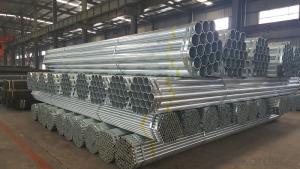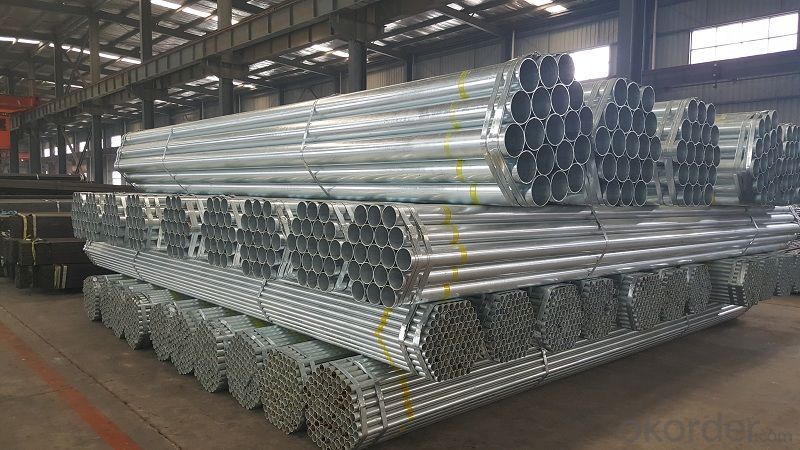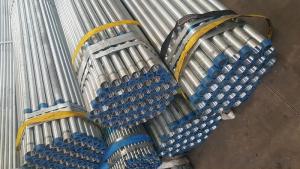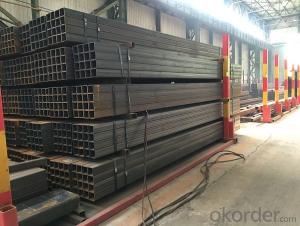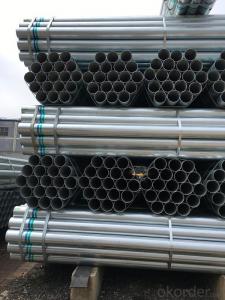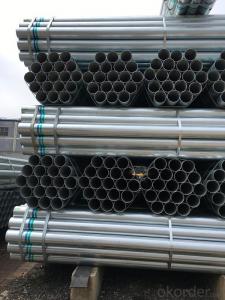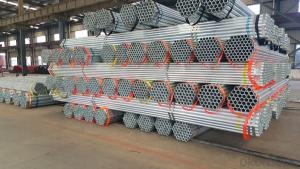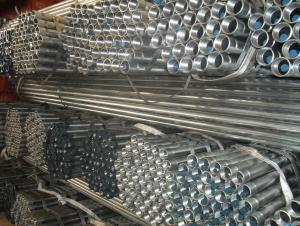Welding of galvanized steel pipes for mining and metallurgy
- Loading Port:
- Shanghai
- Payment Terms:
- TT OR LC
- Min Order Qty:
- 15 m.t.
- Supply Capability:
- 12000 m.t./month
OKorder Service Pledge
OKorder Financial Service
You Might Also Like
Specification
1、Structure of Welding of galvanized steel pipes for mining and metallurgy
The surface of galvanized steel pipe welded steel pipe of hot dip galvanized layer or. Galvanized can increase the corrosion resistance of the steel tube, prolong service life. Galvanized pipe is widely used, in addition to water, gas, oil and other general low pressure fluid pipelines. It is also used in the petroleum industry, especially for offshore oil field of oil well pipe and oil pipe, chemical, coking equipment of oil heater, condensation cooler, coal run oil exchanger tube, and trestle pile, the mine tunnel support frame tube.
2、Main Features of Welding of galvanized steel pipes for mining and metallurgy
• High manufacturing accuracy
• High strength
• Good visual effect
• Reasonable price
3、 Welding of galvanized steel pipes for mining and metallurgy Specification:
Standard | GB, DIN, ASTM ASTM A106-2006, ASTM A53-2007 |
Grade | 10#-45#, 16Mn 10#, 20#, 45#, 16Mn |
Thickness | 1 - 33 mm |
Section Shape | Round |
Outer Diameter | 21 - 610mm |
Place of Origin | Tianjin, China (Mainland) |
Secondary Or Not | Non-secondary |
Application | Hydraulic Pipe |
Technique | Cold Drawn |
Certification | API |
Surface Treatment | factory state or painted black |
Special Pipe | API Pipe |
Alloy Or Not | Non-alloy |
Length | 5-12M |
Outer Diameter | 21.3-610mm |
Grade | 20#, 45#, Q345, API J55, API K55, API L80, API N80, API P110, A53B |
Standard | ASME, ASTM |
1) Material:Q195 Q235 Q345 X42 X52
2) Specification range:OD:21.3-610mm,WT:6-70mm,length:6-12m or according to the requirement of clients.
3) Excutive standards:GB,ASME API5L.ASTM A 106/A53,Despite of the above standards,we can also supply seamless steel pipe with standard of DIN,JIS,and so on,and also develop new products according to the requirements of our clients!
4) Surface: galvanized.
5) Ends:Beveled or square cut,plastic capped,painted.
6) Packing:bundles wrapped with strong steel strip,seaworthy packing.
4、Packaging & Delivery
Packaging Details: | seaworthy package,bundles wrapped with strong steel strip |
Delivery Detail: | 15-30days after received 30%TT |
5、FAQ of Welding of galvanized steel pipes for mining and metallurgy
:
①How is the quality of your products?
Our products are manufactured strictly according to national and internaional standard, and we take a test
on every pipe before delivered out. If you want see our quality certifications and all kinds of testing report, please just ask us for it.
Guaranteed: If products’ quality don’t accord to discription as we give or the promise before you place order, we promise 100% refund.
②How about price?
Yes, we are factory and be able to give you lowest price below market one, and we have a policy that “ for saving time and absolutely honest business attitude, we quote as lowest as possible for any customer, and discount can be given according to quantity”,if you like bargain and factory price is not low enough as you think, just don’t waste your time.Please trust the quotation we would give you, it is professional one.
③Why should you chose us?
Chose happens because of quality, then price, We can give you both.Additionally, we can also offer professional products inquiry, products knowledge train(for agents), smooth goods delivery, exellent customer solution proposals.Our service formula: good quality+good price+good service=customer’s trust
SGS test is available, customer inspection before shipping is welcome, third party inspection is no problem.
6、 Welding of galvanized steel pipes for mining and metallurgy Images:
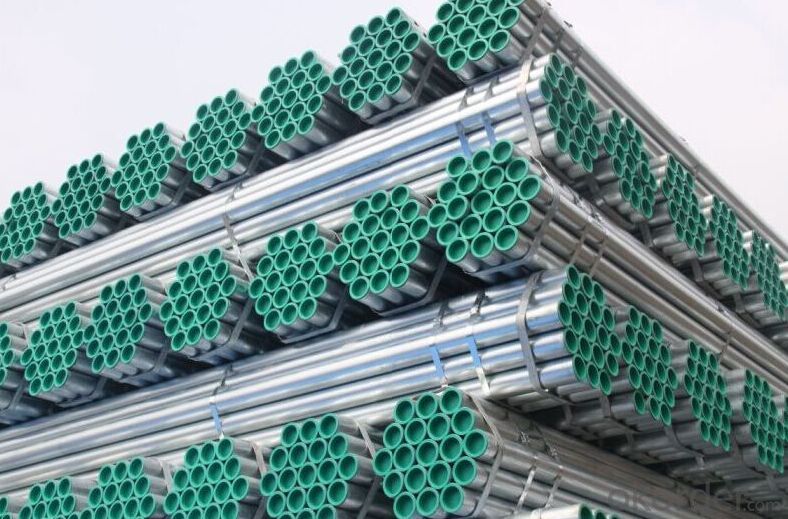
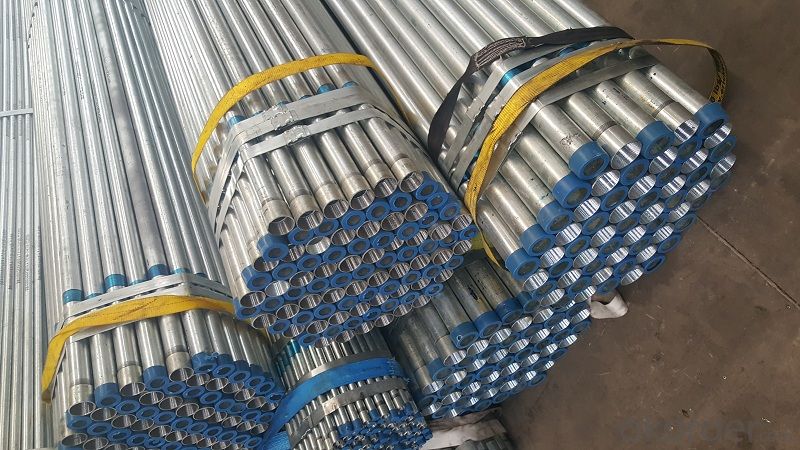
- Q: Who knows what is the difference between double submerged arc welded pipe and longitudinal submerged arc welding?
- The straight seam welding is relative to the spiral welding and the T-shaped welding, and so on.
- Q: What is the difference between hot dip galvanized steel pipe and galvanized steel pipe?
- Galvanized steel pipe is commonly known as "cold plated tube", using electroplating process, only galvanized steel pipe in the outer wall, the wall of the pipe is not galvanizedHot dip galvanized steel pipe adopts hot-dip galvanizing process, and the inner and outer walls of the steel pipe have zinc coating.
- Q: What is the average lifespan of steel pipes?
- The average lifespan of steel pipes varies depending on various factors such as their quality, usage, and maintenance. However, under normal conditions, well-maintained steel pipes can last for several decades or even longer.
- Q: How are steel pipes protected against mechanical damage?
- Steel pipes are protected against mechanical damage through various methods such as coating them with corrosion-resistant materials, covering them with protective sleeves or wraps, or installing them in underground or enclosed structures to prevent external impact.
- Q: Can steel pipes be used for underground water supply networks?
- Yes, steel pipes can be used for underground water supply networks. Steel pipes are durable, resistant to corrosion, and have high strength, making them suitable for carrying water underground. Additionally, steel pipes can withstand high pressure and temperature variations, ensuring a reliable and long-lasting water supply system.
- Q: Can steel pipes be recycled after their useful life?
- Yes, steel pipes can be recycled after their useful life. Steel is a highly recyclable material, and this includes steel pipes. Recycling steel pipes involves collecting the used pipes, cleaning them to remove any contaminants, and then processing them into new steel products. The recycling process helps to conserve natural resources, reduce energy consumption, and minimize waste. Additionally, recycling steel pipes helps to reduce the environmental impact associated with the production of new steel.
- Q: What are the different types of valves used with steel pipes?
- There are several types of valves commonly used with steel pipes, including ball valves, gate valves, globe valves, check valves, and butterfly valves. These valves serve different purposes and have various designs, such as quarter-turn operation for ball valves, wedge-shaped gates for gate valves, and disc-shaped elements for butterfly valves. Each type of valve offers specific advantages and is selected based on the application requirements and the flow control needs of the steel pipe system.
- Q: How do you calculate the pipe flow velocity for steel pipes?
- To calculate the pipe flow velocity for steel pipes, you can use the formula: Velocity = (Flow rate / (π * (Diameter/2)^2)). This equation takes into account the flow rate of the fluid through the pipe and the diameter of the steel pipe.
- Q: How can seamless steel tubes be produced?
- Tube mill, round tube billet, heating, perforation, three roll cross rolling, rolling or extrusion, removal of pipe, sizing (or reducing diameter), cooling, straightening, water pressure test (or flaw detection), marking, storage, cold rolling and hot rolling. Generally cold rolling, because of high accuracy.
- Q: What are the different types of steel pipe supports for seismic applications?
- Some of the different types of steel pipe supports for seismic applications include sway braces, rigid braces, snubbers, and spring hangers.
Send your message to us
Welding of galvanized steel pipes for mining and metallurgy
- Loading Port:
- Shanghai
- Payment Terms:
- TT OR LC
- Min Order Qty:
- 15 m.t.
- Supply Capability:
- 12000 m.t./month
OKorder Service Pledge
OKorder Financial Service
Similar products
Hot products
Hot Searches
Related keywords
